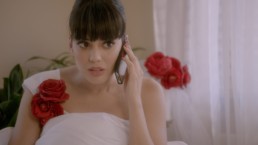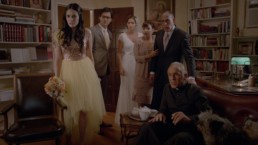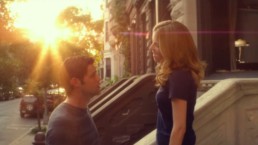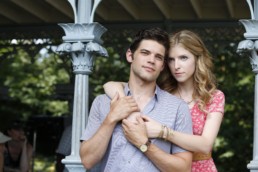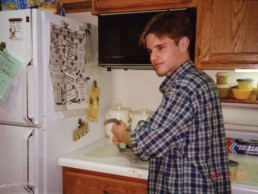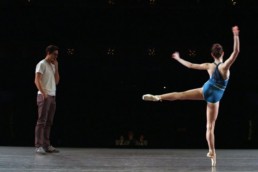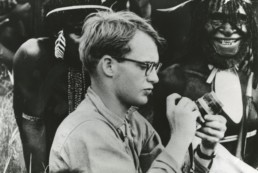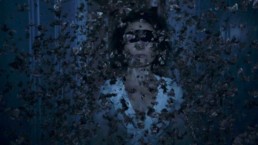Edy Ganem on 'Ana Maria in Novela Land'
Edy Ganem's fame is rising, and if her Twitter followers prove anything, it's that she has a loyal army of supporters that can't wait to see her big break in the romantic comedy Ana Maria in Novela Land. With the success of her role as Valentina Diaz in Lifetime's award-winning series Devious Maids and now her starring role as not one, but two characters, further proves that her name is one to remember. Ganem, extremely humble and charming at only twenty-five, she jumped on the phone to talk about her first lead role and working with the late actress Elizabeth Peña– which happened to be her last film. We begin:
CINEMACY: THIS IS YOUR FIRST TIME IN A LEADING ROLE, SO HOW HAS THIS EXPERIENCE BEEN FOR YOU?
EDY GANEM: It’s been a whirlwind; I’m starting to find that this whole career tends to be really ‘whir-windy,’ haha. I got the script for this as I was finishing filming Devious Maids in Atlanta and within a week of being back in L.A., we started filming Ana Maria in Novela Land, so it was really stressful that week. We had rehearsals, fittings, and I had the script in my hands and kept wondering, “How am I going to do this?”“Do I memorize everything right now?” I was freaking out. Once I got on the set I got the hang of how everything worked, and after meeting everyone else, it became a really, really fun experience.
I didn’t realize what all was going on until after I was done. I played not only one, but two roles– I thought that was really badass. I think that’s what attracted me from the beginning, as an actress, how fun is this? I get to play two completely different characters.
YOU WERE REALLY CONVINCING TOO, I DIDN’T REALIZE YOU WERE PLAYING BOTH CHARACTERS…
Ha! Yeah the makeup crew was great! They really brought their A-game for this.
HOW MUCH OF YOURSELF DID YOU BRING TO EITHER CHARACTER?
I didn’t have to audition for this part, but normally when you do audition, there is a character description and a breakdown. Since the role was offered to me [and there was no description] I was like, “Woah, I can’t believe they trust me to do this. What of they don’t like what I do?” It was an honor to be able to come in and know that they thought I would be a good Ana Maria and a good Arianna.
I think as an actor, every character I play is in a way me because I can’t be anything but myself. That’s how I feel. I know there are different actors out there with different approaches but for me, I just mute certain characteristics and bring out or enhance other aspects of myself. For example, if I’m playing a really violent person– in general I’m not violent– I could mute the loving, peaceful part of me and emphasize my “angry” self. For Ana Maria, I’ve always had a bit of a quirky side and a little bit nerdy, and so I really focused on that. Arianna is a person I am not like at all; I would never be so demanding and self-centered, but it doesn’t mean that sometimes I want to be like that! How fun would it be if I were a little more bitchy? Like if someone was to say something to me, I’d just reply, “shut up!” Haha. I bring that side out in Arianna. It’s good therapy!

DID YOU HAVE TO WATCH ANY SOAP OPERAS FOR RESEARCH?
I’ve already seen so many. I grew up in Mexico, my whole family is Mexican and I feel like it was a part of our culture. I knew how soap operas worked, I just never thought I would be part of one! It was actually a little bit challenging because acting for film and TV is very different from what we see in the Latin community. In soap acting, everything is more passionate and big. We actually had [co-star and Columbian soap opera actor] Juan Pablo Gamboa on set so it was fun to get advice from him. It was really fun, I have to say– I think it was a little bit more fun to play Arianna because of how crazy she gets. Yeah, I really enjoyed being in the novela world.
LUIS GUZMAN IS IN THIS FILM TOO, WHAT WAS WORKING WITH HIM LIKE?
He is such a sweet guy, really down to earth and willing to be there for you. I feel like he has an intense stare that can come off as a little bit intimidating but he is such a sweetheart! I wore some crazy high heels in one of the scenes and in between takes he would look at me and be like, “Are you ok mommy? You need to sit down? Are your feet hurting?” The fact that somebody even notices that you might need to sit down is just so caring. That was the case with everyone; we all had a blast on set because we were all there to really bring it and willing to play.
I told her the first day I was on set with her that it was an honor to be able to work with her and I’m so glad I said that...
SADLY THIS IS ELIZABETH PEÑA’S LAST FILM, HOW DID SHE AFFECT YOU AS AN ACTOR?
She had been working so long and I believe she paved a road for a lot of us newcomers, and so for me to get to work with her was very– it was so unexpected; to be with one person one day and then learn the next day that they’re no longer with us was hard. I told her the first day I was on set with her that it was an honor to be able to work with her and I’m so glad I said that because now, more than ever, you realize you don’t know what’s going to happen tomorrow. I have to say, my memories of her are of a joyful, smiling, laughing woman because that’s what we did all day on set. She literally had to clean and re-do her makeup because she would be laughing so hard her eyes would cry. We also had wonderful conversations about life, boyfriends, and marriage. She was so inspiring and such a strong woman.
So far my career has been wonderful in that I’ve been able to work with amazing people. In Devious Maids I worked alongside Eva Longoria and Marc Cherry and the cast: Dania Ramirez, Roselyn Sanchez, Ana Ortiz, Judy Reyes and in this film I get to work with Elizabeth Peña and Luis Guzman.
DURING THE FILM’S CREDITS THERE IS THIS GIANT DANCE PARTY– I IMAGINE THIS WAS LIKE THE ATMOSPHERE ON SET…
Haha yes! That scene was so funny and so fun. At first we were like, “What are we doing?” The fact that everyone was nervous like, “wait how do I dance? I don’t have a style,” oh we were so nervous! I actually had some choreography and had to learn my moves with a dancer, but after we got into it and everyone started dancing, nobody could stop them.
ANA MARIA FINDS SOLACE IN HER TELENOVELAS, WHAT DO YOU PERSONALLY FIND SOLACE IN?
Depending on how I’m feeling or where I am in my life, I always try to look back at the basics and realize that no matter what I may be going through, I am really lucky and blessed to have my family, to be healthy, to be alive and to know that even if everything goes wrong, I can still get up every morning and start again. As long as I’m alive and healthy, I can keep going! It sounds really simple, and it is.
For our review of Ana Maria in Novela Land, click here.
Review: 'Ana Maria in Novela Land'
We all have guilty pleasures, and for Ana Maria (Edy Ganem), the telenovela 'Pasión Sin Limites' is hers'. Besides running a fan-fiction site dedicated to the show, Ana Maria unintentionally, but completely, disregards her family, friends, and even loses her job– all for putting the show and its lead character, Ariana Tomosa, first. In a word, she is: obsessed. However, through an unexpected twist of fate, Ana Maria discovers first-hand that the grass isn't always greener on the other side in this traditional romantic-comedy with a twist.
Let me start off by saying that Ana Maria in Novela Land is silly, but intentionally so–and that self-awareness is part of its charm. It's Freaky Friday meets Desperate Housewives with the vibe of a Disney Channel original movie. Nevertheless, it is not meant to be taken seriously, so if you decide to watch this film for anything other than light, harmless humor, you should probably find another movie.
Let me start off by saying that Ana Maria in Novela Land is silly, but intentionally so–and that self-awareness is part of its charm.
Edy Ganem (Devious Maids) is fantastic in her breakout role as Ana Maria, a twenty-something single girl who still lives at home with her parents and finds solace in her daily telenovela-watching. As she watches the show with her parents one night, simultaneously live-tweeting her followers, a crash of thunder booms and magically, Ana Maria is transported into Novela Land, replacing its leading lady Ariana (also played by Ganem). Ariana, in turn, wakes up in Ana Maria's world, and her spoiled self doesn't know what to do in the "real world." It's a classic tale of comedically introspective self-confrontation, discovering one's own flaws and trying to change for the better, and the fact that it is an all Latino cast is a very welcomed addition to the genre.
Ana Maria in Novela Land has the traditional romantic-comedy formula for success: a charming leading lady, a funny script, and colorful imagination. Director Georgina Garcia Riedel gives Ganem a lot of material to work with in playing both characters, and while audiences will obviously need a suspension of disbelief to enjoy the film, it is still quite charming. Ganem is joined by veteran actors Luis Guzmán (Boogie Nights) and the late award-winning Elizabeth Peña (La Bamba), who passed away last October from cirrhosis of the liver. This is actually Peña's last film, so fans of hers should definitely seek this one out (the film is dedicated to the late actress).
Overall, Ana Maria in Novela Land is a harmless and humorous film that will have no problem finding its key demographic among teens and those looking for a carefree film. Due to its breezy nature, I believe it would make for a very funny play. Running at just about an hour and a half, this film may be your next guilty pleasure.
https://www.youtube.com/watch?v=XGKgnANGQiI
Anna Kendrick, Jeremy Jordan and Richard LaGravenese on 'The Last Five Years'
Anna Kendrick is a self-proclaimed "bad bitch," and behind her girly demeanor and perfectly pressed outfit at our press conference, she's totally right. Kendrick owns the room at The Four Seasons Hotel where she sits alongside co-star Jeremy Jordan and director Richard LaGravenese, Granted, most of the questions are fielded her way, and she could not have been more humble and hilarious (and bad-ass) about it. Her newest movie, The Last Five Years, is not just another musical for Kendrick, or for Jordan and LaGravenese, for that matter. With its totally unique and unconventional structure, it is unlike any movie any have worked on before. As many of the songs were recorded live during the filming process, we certainly had a lot to talk about, such as the biggest challenges making the film, Kendrick's worst audition, and those darn cicadas that nearly cost them a day of shooting. We begin:
CINEMACY: HOW DID YOU GO ABOUT TRANSLATING WHAT'S BASICALLY JUST A TWO PEOPLE ON STAGE, TO AN IMMERSIVE, FULL PERFORMANCE?
RICHARD LaGRAVENESE: Originally the show was done as monologues out to the audience and in listening to it I couldn't help but imagine it as playable scenes, because the songs not only belong to the person singing but also to the person receiving it and it adds a whole other layer to relationships. We worked on backstories for the characters so that when they're "listening," their emotional story is being forwarded. [Anna and Jeremy] worked very hard on that.
ANNA KENDRICK: The director of the original production, Daisy Prince, came to set one day and she was having a sort of "out-of-body" experience because first of all she was like, "Cathy speaks!" That was new for her. Also she didn't know that Cathy would be so artsy, and I forget sometimes that we weren't working from material that dictated all of these things, because my first experience was reading Richard's screenplay. For every high school, college, professional production of this, this isn't the definitive version of Cathy and Jamie.
ANNA, YOUR CHARACTER GOES THROUGH A TERRIBLE AUDITION PROCESS IN THE FILM. WHAT WAS YOUR WORST AUDITION?
AK: So many terrible auditions... [Laughter]. I remember once for this movie that was mediocre at best, there were all these girls and boys for the two leads in this coming of age tale, and the director wanted us to dance together. The director brought us all into the room, how horrifying, and we had to dance with each other in front of everyone else and then we had to perform the scenes in front of everyone. Oh my god, I still think about it to this day, it's the memory that pops up when I'm about to fall asleep and then I'm just like, up until 2:30am. Cold sweats. So certainly, I recognize myself very much in the song "Climbing Uphill."
HOW DO YOU OVERCOME THAT REJECTION?
AK: Oh I'm just a bad bitch [Laughter]. That's the thing though, clearly I don't. I'm still thinking about it. It's like any embarrassing experience that you have, I think it just makes you normal. I don't feel the need to move past it because it's a part of me and if I didn't have those experiences, I would be unable to relate to other people because I would be like, "what do you mean you were embarrassed? Isn't everything wonderful for you all the time?" It's good to be humbled.
JEREMY JORDAN: Shame is good.
AK: Shame is good. Self-doubt is healthy [laughter].
RICHARD, HOW DID YOU APPROACH THIS FILM SO IT WOULD COME ACROSS AS INCLUSIVE TO THE PEOPLE THAT MAY NOT BE FAMILIAR WITH THE PLAY?
RL: I didn't [Laughter]. My goal here was to make something for myself and people that I know love theater. I am a geek and I know that this score is a classic among us, and nowadays I realize that with the technology business changing so much from when I started, there are opportunities where I don't have to appeal to a mass audience anymore, I can make something that's different and risky and do it the way I want to do it. That's why I didn't want to [make this film] with any Hollywood involvement– I didn't want people to impose on it, to make it more "accessible" to the general public. I'd like the general public to step up and say this is something different. People who will like it will like it, people who don't get it will not get it at all. And that's fine with me.
YOU BOTH ARE INCREDIBLE SINGERS, WHAT WAS THE MOST CHALLENGING SONG TO SING?
JJ: The most challenging song for me was probably the "The Schmuel Song." We were in a 95 degree apartment in the middle of summer wearing Christmas sweaters...
AK: I was so smelly and he had to pretend to like me...
JJ: So smelly. I had to scream as an old Jewish man and at the same time, have 20 different props and dress [Anna] by putting bows on her head and use swords made out of umbrellas, Oh God. And she's just sitting on the couch making fun of me the entire time. It was probably one of her favorite days, although it was a nightmare for me.
AK: I really enjoyed doing "Summer in Ohio" because it was a sort of fantasy and it's one of the only pieces in the film that's actually like a fantasy. I guess to most challenging was "See I'm Smiling" just by the nature of it, trying to be honest in that song and also trying to belt D's and stuff.
JJ: There were some people across that lake [shooting location] that were like, what the hell is going on over there?
RL: We also had the luck of the cicadas– apparently they make their migration to Staten Island once every 16 years, and that Wednesday they decided to come. This is going to sound like a made up story but it's not because I was freaking out. On the sound man's chair there was a cicada, and just for a joke I knelt down and said "please tell your people to just be quiet" [Laughter]. We ended up not having too bad a time with them.
BEING THAT THIS IS NOT YOUR FIRST TIME DOING A MUSICAL, HOW DIFFICULT IS THIS ONE IN COMPARISON TO THE OTHERS LIKE PITCH PERFECT & INTO THE WOODS. THEY'RE ALL MUSICALS, BUT COULDN'T BE MORE DIFFERENT.
AK: You're absolutely right, I think that it's a cute tagline for people to say I'm doing these musicals all in a row but they're such different movies, they don't feel the same at all. Especially because Into The Woods was this enormous production and we had the time and resources to be perfectionists and I was very, very grateful for that and this was more a situation that was held together with love and duct tape, and that's exhilarating, actually. If anything, I found the waiting on Into The Woods one of the many challenges. To be on a time budget [with The Last Five Years] and be that focused was incredibly helpful. If I'm honest, I prefer this way of working, but it's just not conducive to telling a story like Into The Woods so very different experiences but equally rewarding.
Well, if I knew the secret there wouldn't have been so many takes where I sounded like a f*cking dying chipmunk.
I HEARD YOU SANG "STILL HURTING" 17 TIMES.
AK: Sure... [Laughter].
RL: It wasn't because of her voice, most of it was because of the camera hitting the table...
AK: That's the real problem with movies, the camera.
HOW DID YOU KEEP THAT SONG FRESH AFTER SINGING IT SO MANY TIMES?
AK: I feel like I drew a lot of energy from the support of the crew who were unbelievably compassionate and understanding. Nothing gave me greater inspiration than seeing the 40-year-old dolly operator in his classic Hawaiian t-shirt, he had the same earpiece in his ear that I had and watching his face and all these people are honoring the thing that you're trying to do, that gives you an unbelievable reserve of energy.
HOW DIFFICULT WAS IT TO DEVELOP CHEMISTRY WITH JUST 21 DAYS OF SHOOTING?
JJ: We didn't [Laughter]. Haha no, you know like anybody getting to know somebody, we went and had drinks and got drunk. And told some fun stories about each other. And then you go to work and then you mind that experience when you have to get intimate, and then you learn to laugh sh*t off too. You learn to just have fun and not take it too seriously... until Richard makes you do seven takes in a row of yelling at Anna Kendrick and then you're like, "I need a hug."
DID YOU FIND YOURSELF SIDING WITH ONE CHARACTER OVER THE OTHER AT THE END OF THE FILM?
JJ: Naturally when you're shooting it you're going to side with your own character because you have to get into the headspace of that person, you understand them.
RL: My approach was: everybody has their reasons. Love is this poor thing, we put so much pressure on it, it has to be forever, it has to look like this, it has to feel like this, and I think you have to fall in love with certain people to evolve personally. It doesn't mean that the love that was lost is a regret, it means it was necessary for you at that time. I believe [Cathy and Jamie] really loved each other, but it wasn't just about that. She had an identity that was being subsumed by his, he was in a new place in his life; they loved each other but it didn't work out, and how often does that happen to all of us?
WHAT IS THE SECRET TO CRYING AND SINGING WITHOUT MESSING UP THE MAKEUP?
RL: Haha, what's the secret!?
AK: Well, if I knew the secret there wouldn't have been so many takes where I sounded like a f*cking dying chipmunk. The thing was, we were open to the idea of sacrificing a certain amount of vocal quality for performance. In "Still Hurting," that was sort of fine. But then in something like "See I'm Smiling," at the end of that day I screeched. I was absolutely undone.
RL: She had to, emotionally that's where she was.
AK: We just had to go through it and hope for the best because in that scene she is powerful and she is expressing herself and we just had to go for it. By the end of that day there was nothing going on in the old throat center.
THIS IS COMING OUT RIGHT BEFORE VALENTINE'S DAY, DO YOU SEE THIS AS A DATE MOVIE?
RL: Well this weekend you can have the real hard sex with 50 Shades of Grey and then come and see us and see what happens after the hard sex and you have to deal with reality.
JJ: I'm pretty sure our sex in the movie was PG-13.
RL: I know that when people come to see this, the movie is reflective of where you are at that time. I showed it to a young friend of mine who hated [Jamie] and I didn't understand why until realized she had just broken up with her boyfriend. You project whatever you're feeling onto it, and that way if you're thinking about love on Valentine's Day weekend it's a great movie...
AK: Yeah, it's also a great movie to say, "aww, I'm so glad our relationship is so healthy."
Check out our review of The Last Five Years here.
Review: 'The Last Five Years'
"Is there anything Anna Kendrick can't do?" That was an actual note I made during the screening of The Last Five Years, right after Kendrick finished singing her first song "I'm Still Hurting." Wow–not only has this girl proved she has the acting chops to be taken seriously as both a dramatic and comedic actor, but she has also mastered the overly-critical genre of the musical (See: Into The Woods). In The Last Five Years, Kendrick plays Cathy, a struggling actress, who meets and falls in love with budding novelist Jamie, played by Broadway veteran Jeremy Jordan, and sees their proceeding five-year relationship chronicled through the good times and the bad. But while Kendrick is the obvious life-force behind this film, unfortunately even she cannot save the unbalanced and lackluster story.
One of the film's most unique attributes is also its biggest flaw–The Last Five Years is told almost entirely through song and from Cathy and Jamie's own perspectives. Cathy's songs and story begin at the end of her and Jamie's relationship and works backward in time while Jamie's songs start at the beginning of their relationship and move forward. Their stories connect in the middle when Jamie proposes which, yes, gets confusing. Think of it as Rent meets The Disappearance of Eleanor Rigby Him/Her, meets Inception.
Jordan should have played more with Kendrick as opposed to against her– their performance already lacked the depth needed to really care about these characters, but he makes it too easy to choose sides in their relationship and be much more sympathetic towards Cathy's heartbreak than his own.
The structure is very layered and can get confusing at times, and the cinematography doesn't do the film any futher favors. Most of the scenes are shot handheld-style and (intentionally?) shakey, which further highlights the film's unbalance. There are, however, steady, sweeping long takes that I absolutely loved, and wished lasted the entire film. Since The Last Five Years was adapted from a Broadway play, I understand the homage to the original with the long takes and letting the actors have space to play with the camera following, but having a more subdued handheld approach would have better served the film, and given the actors more of an empty pallet to play with.
Speaking of actors, I've already professed my utmost admiration towards Kendrick, who gave life to every single word she sang and whose passionate voice equally matches her talent. Jeremy Jordan, while undoubtedly a talented singer, didn't fit in as well. His overly charismatic attitude and over-the-top gestures make him an easy target to classify as a "stage actor" as opposed to a "film actor." His presence is very large, too overbearing and animated for the silver screen. Jordan, who originated Jack Kelly in the original Broadway production of Newsies (the best musical ever made says this reviewer) should have played with Kendrick more as opposed to against her–their performances already lacked the depth needed to really care about these characters, but he makes it too easy to choose sides in their relationship and be much more sympathetic towards Cathy's heartbreak than his own.
For musical theater buffs, The Last Five Years coming to the big screen may raise questions of execution–just how can a love story told from two different perspectives during two different points in the characters' lives translate on screen? While the Broadway run had the characters break the fourth wall and sing out to the audience, Director Richard LaGravenese, whose previous projects include P.S. I Love You, takes on the ambitious task of adapting this made-for-the-stage musical into a niche, "Un-Hollywood" movie. He succeeds in staying true to the original show, keeping the score true and the story the same, but this seems to be one of those adaptations that didn't quite hit its mark.
Unlike stereotypical films, the ending here is bittersweet. Don't expect to leave the theater smiling, but you can count on trying to recall all of the songs and attempt to sing them on the way home. Because of the nature of the story and the niche genre, I'd predict that The Last Five Years won't have much staying power past its opening weekend, but for those who are either familiar with the play or are fans of musicals, this is right up your alley. Those of you who aren't...well, go into it with an open mind.
https://www.youtube.com/watch?v=1dT0mrKzObw
Review: 'Matt Shepard Is a Friend of Mine'
In 1998, news broke that a young male was found beaten and nearly dead, tied to a fence in rural Wyoming. That person was 21-year-old Matt Shepard, who would later succumb to his fatal injuries, but not without leaving a lasting impression on the world at large. Matt was targeted because he was gay, and his attack is still considered one of the worst hate crimes in American history. The documentary Matt Shepard Is a Friend of Mine is an intimate documentary and look at the life of the person we've come to know only through newspaper headlines, made by Shepard's friend and first-time director, Michele Josue.
The purpose for making the documentary is to share the "real" Matt Shepard with the world who never had the privilege of getting to know him. We come to understand– through archival footage, never-before-seen photos and friends interviews– that Matt was your average kid, the oldest son to Dennis and Judy Shepard in a family of four. The Shepards relocated to Saudi Arabia for Dennis's job where Matt attended The American School in Switzerland and ended up befriending the director, Michele. It's this era of Shepard's life when we as the audience get to learn more about him. Josue reveals that on a school trip to Morocco, Matt was raped by six men in a dark alley and was never the same after that. That incident is shared, among other previously unknown struggles that lead up to the fatal event in 1998.
This is a story to enlighten the audience about the "real" Matt Shepard– but how are we supposed to get to know Matt when the director makes it too much about herself?
First hand accounts from Matt's friends and family describe a very normal kid who was struggling with finding himself, a feeling we can all identify with. One of the better interviews in the film comes from a priest who knew Matt. He talks candidly about the attackers, saying that no matter how much hate there is in our hearts towards the assailants, Aaron McKinney and Russell Henderson, we must remember that they too are children of God and deserve our sympathy. Forgiveness seems to be a difficult concept for Josue to grasp, as she breaks down during the interview and starts crying, questioning how somebody who did such a terrible thing could possibly be "forgiven." The scene is tension filled, and extremely real.
It is evident from the very beginning of the film that this is an extremely personal project for Josue, so much so that she does not detach from the story to focus on the bigger picture. Rather, she injects herself into every interview and scene and is the film's biggest distraction. At times, it is uncomfortable to watch her ask her interviewees a question while she sits across from them and cries. It would have been an emotional moment if it happened once, or maybe twice, but this happens every time. It would have better served the film to cut Josue's screen time down (or completely), especially during the interviews, because as she states in the beginning of the film, this is a story to enlighten the audience about the "real" Matt Shepard– but how are we supposed to get to know Matt when the director makes it too much about herself?
If you can look past those distractions, the film itself runs at a steady pace and keeps our interest. Although the montage of Josue walking near the field where Shepard's body was found seems amateur and redundant, but there was one special moment at the end that brings a tear to the eye, when Matt's dad reads a letter he penned to his deceased son. He talks about his favorite memories with his first-born and his gratefulness that God was watching over him while he lay alone in that Wyoming field. It is a hard scene to get through without getting emotional and feeling extreme sympathy for the Shepards and their friends.
Gay rights is a hot button issue in America that continues to be a struggle for many, and the hope is that by watching this film, one may find more tolerance and acceptance in their hearts. While I completely agree and support this mission and applaud Josue for her efforts, which must have been an extremely cathartic project for her, this film didn't reach its full potential in storytelling or effect. In any case, Matt Shepard will never be forgotten; his story continues to affect people today, even 17 years later.
https://www.youtube.com/watch?v=uZj46ewvR6k
Review: 'Ballet 422'
The ballet world has always fascinated me. Growing up, I took tap dance lessons and every time I would pass the ballet practice room I would get caught up in the movement– how effortless and graceful they all looked, even at a young age. The same fluidity is captured here in director Jody Lee Lipes' documentary, Ballet 422, a backstage look at the pressures and pleasures of dance, specifically focusing on Justin Peck as he works his way through choreographing the New York City Ballet's 442nd original piece.
The New York City Ballet is one of the most prestigious dance companies in the world, and 25-year-old Peck has been given the opportunity to create an original piece in two month's time. He remains calm, cool, and collected throughout the audition process, the rehearsals, wardrobe fittings, tech run-throughs, and finally, opening night. His demeanor grounds the film; he is quiet, but do not mistake his quietness for being aloof. He is intensely focused on the task at hand, and his creative process is fascinating to watch play out on screen.
Anyone who has been a part of a staged production in one way or another will truly appreciate the dedication the film makes to each step along the way, not brushing over the more technical aspects of pre-production just to get to the dancing.
The stakes are high and the pressure is felt on the stage and on the screen, but the tension is not overbearing for the audience. We're not clenching in our seats, wondering if the dance will get completed on time; rather, we're drawn in to this crazy and unpredictable life of a performer. This subtlety of how director Jody Lee Lipes approaches the creative process captures the strength of both the dancers and the film. It's visually poetic and arresting without force. This is not a "talking heads" type of documentary either, Lipes takes the fly-on-the-wall approach as the quiet observer, which is exactly the right decision for the betterment of the film.
The look of the film has a high fashion/crispness to it- it's worth noting that Lipes is also the cinematographer, whose Director of Photography reel includes Martha Marcy May Marlene and Tiny Furniture. The boldness of the red curtain on stage juxtaposed with the buzzing overhead fluorescent lights in the practice room makes a visually stunning contrast that is equally met with the score of the film, which also happens to be the score of the ballet. The orchestral grandness gives the film an elitist feel, as we watch some of the worlds' most talented ballet dancers take to the stage and finally perform Peck's masterpiece.
Anyone who has been a part of a staged production in one way or another will truly appreciate the dedication the film makes to each step along the way, not brushing over the more technical aspects of pre-production just to get to the dancing. In fact, I actually would have enjoyed even more time spent on the dancers. Like I said, I become entranced very quickly. The audience I was surrounded by during the screening was not full of journalists; rather, they were ballet enthusiasts who were eagerly awaiting the prodigy Justin Peck's big screen debut. After the film was over, everyone left smiling, myself included. At its core, Ballet 422 is a unique and successfully executed documentary that is sure to leave you smiling too.
https://www.youtube.com/watch?v=b9s7wJ-PC70
Review: 'The Search For Michael Rockefeller'
Looking at a picture of Michael Rockefeller, he could easily pass as your average 23-year-old Silver Lake hipster: Tortoise-shell glasses, unkempt hair, and a wanderlust spirit shine through the only remaining photos of him. While his disappearance is still an unsolved mystery, his name remains in the front of our minds, especially in director Fraser C. Heston's, who uncovered a treasure trove of never before seen footage, shot by a man who set out to search for the young Rockefeller back in the sixties. Heston uses this footage and finishes the film that was never made, appropriately titling it, The Search For Michael Rockefeller.
It's one of the country's greatest mysteries- Just what happened to Michael Rockefeller, son of New York Governor Nelson Rockefeller and heir to the J.D. Rockefeller oil empire? During an expedition to New Guinea in 1961, as is last documented, Michael was traveling on a motor boat with a companion and some locals when it suddenly broke down, stalling in the middle of the Ocean. For years, many people have speculated that he had drowned at sea while trying to swim to the shore; others are convinced he was eaten by cannibals. Years later, in 1969, journalist Milt Machlin takes it upon himself to discover what happened to Rockefeller by bringing along a film crew to retrace the steps Michael would have walked. What's left is hours of black & white 16mm film that was never followed through by Machlin, but luckily enough, fell right into the hands of Heston, who creates a chilling and exceptionally mysterious documentary with the material he is given.
The last five of the film prove to be most interesting to me, and the woman next to me who audibly gasped- did we just catch a glimpse of Rockefeller?
The style of the film is obviously dated–authentically dated–but dated nonetheless. I mention this because at times the film runs slowly, archival footage of photos with slow zooms in and out can only hold one's attention for so long. It's understandable that Heston only had so much material to work with, and it's not like he could plan any pick-up shoot days or control any cinematic aspect of the film whatsoever, but my resolution to the dragging would be to cut half of the voice-overs. Voice-over narration dominate the film, and each "character" "interviewed" speaks in a distinct accent that sounds like they took inspiration from Disneyland's The Jungle Cruise ride. A bit cheesy, especially since this is the format throughout the entire film.
Historically, The Search For Michael Rockefeller is a great accomplishment for Heston and a very interesting film for audiences. Unfortunately, though, there is no happy or even satisfying ending; in fact, we leave the theater with more questions than answers. The last five minutes of the film prove to be the most interesting to me, and the critic next to me who audibly gasped– did we just catch a glimpse of Rockefeller? The archival footage from 1969 ends on a shot of an Asmat tribe rowing in long boats– all are dark-skinned and wearing tribal jewelry and cloth pieces for clothing. But then there is this one man, shown only for a few frames, who stands in stark contrast with white complexion Upon closer examination and slow-motion, Heston plants a massive seed in our minds: this could very well be the missing the young Rockefeller. But we don't know or learn for sure, and probably never will.
Michael Rockefeller has clearly been a passion of Heston's, and this film is shining proof of that. While interesting for fans of historical documentaries, the average movie-goer may find the execution tired and, shall I say it, boring. I personally found it a little bit of both, but those last five minutes really made the film worth it for me. If this sounds interesting, The Search For Michael Rockefeller will be available to stream on Netflix starting February 1st.
http://vimeo.com/100940064
Review: 'The Duke of Burgundy'
You should never judge a book by its cover, or in this case, a film by its title. From the sound of it, The Duke of Burgundy initially comes across like a stiff, historical bore, with perhaps a hint of mystery based off of its unusual and artistic poster. It doesn't take long (in this case, just about five minutes) to come to the realization that this film is extremely provocative with nothing stiff about it, as we witness a relationship between two women engaging in private role-playing fantasies in this darkly sexual and artfully erotic film.
The film starts out with Cynthia (Sidse Babett Knudsen), a seemingly aristocratic woman, in her home surrounded by furniture made of dark wood, piles of worn books, and preserved butterflies. She is soon joined by Evelyn (Chiara D'Anna), a slightly younger woman whose role seems to be as one of Cynthia's assistant/maid/gardener/and sexual companion. Yes, this isn't a typical employer–employee relationship; rather, we are to discover this is a delicate and desired mistress–servant relationship. The sexual tension is quick to build, so we assume this isn't the ladies' first encounter, but we are left to wonder if this is a twisted, abusive relationship, or a giant role playing facade?
Over the course of the film, they incorporate lingerie, face-sitting, and bondage into their role-play, and the more physical it gets, the more we see Cynthia struggling with her relationship with Evelyn.
The existence of butterflies is a giant thread that runs throughout the film (the "Duke of Burgundy" quite literally being the name of a type of butterfly), the importance being that it is both ladies' passions and areas of study. The beautiful creatures are displayed by the hundreds in Cynthia's house- hung on thin pins in glass shadow boxes (one of Eveyln's "chores" is to dust the delicate collection). An obvious, but true, correlation is the similarity between Cynthia and these butterflies; Both are strong, independent and beautiful, yet extremely fragile. Despite her tough outward demeanor as a sado-masochistic leader, Cynthia shows weakness and uncertainty in her eyes as their relationship gets more intense. Over the course of the film, they incorporate lingerie, face-sitting, and bondage into their role-play, and the more physical it gets, the more we see Cynthia struggling with her relationship with Evelyn. She is not happy, but her unhappiness unfazes Evelyn, who seemingly gets off even more by Cynthia's nonchalance, ultimately leading to an emotional and physical breaking point.
Writer and director Peter Strickland certainly had a vision for The Duke of Burgundy, his keen eye towards building tension and holding suspense is successfully put to use here. Cinematically, the colors and texture of each scene act as a supporting character. It gives off a fantastically haunting vibe that mirror the characters on screen. The music, performed by Cat's Eyes, sounds like a daydream of multi-instrumental, atmospheric pop similar to my favorite rock outfit, Beach House. All of the above give this film a stylized look that Andy Warhol would have been a fan of.
What makes The Duke of Burgundy so great is that the entire movie is a slow reveal; no piece of information is given away too quickly. We learn more about Cynthia and Evelyn as the film develops, making it extremely engaging and which keeps us excitedly guessing as to what will happen next. It is an erotic mystery drama, a genre that I believe Strickland created himself, and which he executes well. With the upcoming release of 50 Shades of Grey, audiences are becoming more open to the idea of seeing such a taboo subject on screen, but unlike 50 Shades, this outrageous S&M material is about two women disguised as proper and sophisticated lepidopterists whose groundbreaking and exploratory relationship makes for an unconventional piece of genre-bending film.
The Duke of Burgundy opens at Landmark’s Nuart Theatre in West LA and IFC Center in New York on Friday.
https://www.youtube.com/watch?v=P-xIMBnclyA

